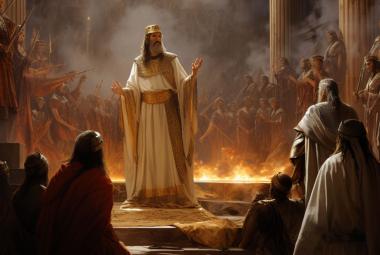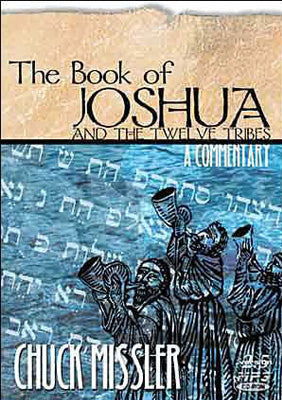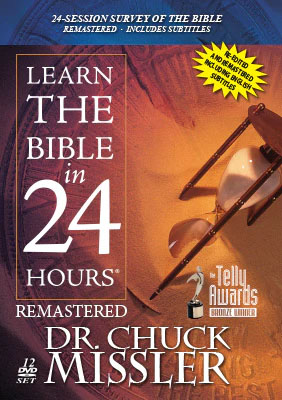The Book of Joshua is a book of adventure and conquest - even the days were not long enough for his battles! His name is the same as Jesus, but in Hebrew rather than Greek: Yeho-Shua, or Joshua. Earning his spurs as an undercover agent, he, along with his confederate, Caleb, were the only two out of the twelve spies that brought Moses a good report. So, forty years later, he was selected to take command of the nation during the conquest of the land of the covenant-dispossessing the usurpers.
This "Sixth book of the Torah" is a book of both physical and spiritual battles with many lessons for all of us.
Two Memorials
When they crossed the Jordan (in a manner conspicuously parallel to the crossing of the Red Sea 40 years earlier), 12 stones were erected on the Gilgal side, after the crossing. Also, just prior to the Jordan's returning to its regular course, Joshua set up 12 stones in the middle of the Jordan. These are not only commemorative of the deliverance, they are also prophetic: the baptism of His death, and the deliverance of His resurrection.
It is interesting that over a thousand years later, at that very spot, 1 John the Baptist pointed to this very memorial to make his point.2
The Amorite Capital
Jericho (Bet Yerah, "the House of the Moon God") was the capital of the strongest of the seven nations then occupying the land of Canaan. (It is interesting that it is again, even in our day, the stronghold of Israel's enemies!)
Despite the declarations of the well-known song, who really "fought the battle of Jericho"? It wasn't Joshua! It was Jesus, in an Old Testament appearance.3
What else makes the battle of Jericho so remarkable? It wasn't just the walls falling down! Almost every ordinance of the Torah seems to have been violated. The Levites were not supposed to go to war, yet they led the march. The Israelites were supposed to work only six days - and rest on the seventh, the Sabbath. Yet here they do seven times as much on the seventh day. And they are not to shout during the various marches, but to keep silent4 (except for the trumpets) until the seventh time on the seventh day.
Those familiar with their Bible can't help but notice that preceding the seven trumpet judgments in Revelation, there is silence in heaven for half an hour.5Perhaps here's a clue.
An Anticipatory Model?
As we examine the Book of Joshua carefully, we notice that it seems to be a precursor to the book of Revelation: where another Yehoshua, as Commander-in-Chief, dispossesses the Planet Earth of its usurpers - first sending in two witnesses, then with a series of judgments of sevens, finally defeating the kings with signs in the sun and moon; and again, the kings hide in caves6 ... etc.
Practical Applications
Perhaps the most important aspects of this military book are the practical insights for our own spiritual warfare.
We may not realize this as we should, but "no conflict, no crown." The first issue is, who has the initiative? Remember, it was God who declared war on Satan (Gen 3:15). When Christ first announced the Church, He pointed out that "the gates of hell shall not prevail against it." 7 It is the Church that has the initiative! That's you and I, isn't it? If we are truly Christian, then we will be the initiators in a very real (spiritual) warfare.
Another thing that strikes you is that the battle of Jericho is in Chapter 6; Chapters 1 through 5 are preparation. Ephesians also admonishes us to "put on the whole armor of God."8 You must do this before - not during - the battle!
Crossing the Jordan?
What does "crossing" this fabled river symbolize? Going to heaven? Hardly. There are aggressive enemies on the other side. Serious warfare. Setbacks and screw-ups.
After they cross the Jordan, the first thing they do is get circumcised!
(For 40 years Israel was not circumcised! What is surprising is that while they were miraculously provided for, they were not rebuked for not maintaining this sign of the covenant. Perhaps there is a parallel here with the Diaspora during which they "are not my people." 9)
They are in enemy territory. So are you and I. But are we prepared? If we are not under attack, perhaps it is because we have not been relevant or focused - or already been relegated to where the enemy wants us.
The House of Rahab
The remarkable episode of Rahab - a Gentile of dubious reputation who yet emerges in the genealogy of the Son of God - is a study in itself. She becomes the mother of Boaz, who, with Ruth, links the House of David with Bethlehem.
(You cannot really understand Revelation Chapter 5 unless you have studied the Book of Ruth as a book of prophecy!)
Where was the most dangerous spot in Jericho? On the walls, of course! Think about it. Yet, where was the safest place in Jericho? In Rahab's house. Where was Rahab's house? On the wall.
The Longest Day
The days were not long enough for Joshua's battles! The famous "Long Day" of Joshua Chapter 10 presents a major difficulty for many. As a contemporary engineer/scientist, and with a non-trivial background in astrophysics, I have no problem with this startling event. There are some very surprising astrophysical implications suggested in the text, possibly involving the orbital resonance and a near pass-by of the Planet Mars (which also are strangely vindicated by an ancient passage in Jonathan Swift's famous Gulliver's Travels).10 Unfortunately, this topic alone exceeds the opportunity in this brief review.
The Book of Joshua is one of the most exciting adventures in all literature, with many real and practical lessons for each of us. As one of the most overlooked books in the Old Testament, it can be one of the most rewarding to the diligent student: it is full of surprises and practical strategic and tactical counsel. Good hunting!
For many, one may rather begin with a strategic overview with Learn the Bible in 24 Hours. Make this year a year of commitment to the Word of God: it will be one of the most rewarding commitments you can possibly make.
Notes:
- At Bethabara, "House of Passage," John 1:28.
- Matthew 3:9; Luke 3:8.
- Joshua 5:14, 15. (Angels don't allow themselves to be worshiped.)
- Joshua 6:10.
- Revelation 8:1f.
- Joshua 10:16ff; Revelation 6:15-17.
- Matthew 16:18.
- Ephesians 6:10-17.
- Hosea 1:9,10; 2:23.
- For a serious study, see our Expositional Commentary on the Book of Joshua.








